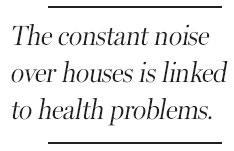Adjusting to the volume
Updated: 2013-09-01 08:10
By Alan Mattingly(The New York Times)
|
|||||||
Even before the first serve in the United States Open tennis championship, going on through Septemeber 9 in New York, there were legacies to consider. The legacy of the 32-year-old Roger Federer, arguably the finest player ever, who some believe is ready for retirement. The legacy of Arthur Ashe, the former champion who died 20 years ago, for whom the championship stadium is named. And, not least to some of that stadium's neighbors, the legacy of the Tennis Climb.
It actually began as the Flushing Climb - a takeoff route at nearby LaGuardia Airport that was created more than two decades ago to keep the roar of jets from disrupting the quiet of the Open. The route has since been modified to the Tennis Climb, a narrower path that is used throughout the year to better coordinate air traffic with John F. Kennedy International Airport, which is also in Queens, about 20 kilometers south. As The Times reported, the narrower path means frequent flights over the same houses, creating an atmosphere that is decidedly untennislike.

"You can't even have a conversation in your own living room," said Janet McEneaney, a resident who has started a group called Queens Quiet Skies.
There are more serious concerns. Henry Young, an aviation consultant, said hearing loss used to be the primary worry about airplane noise, but now, high blood pressure, stress and other problems have gained attention. With less noise, Mr. Young told The Times, "people sleep, students get better grades, houses are worth more money."
George Prochnick, the author of "In Pursuit of Silence: Listening for Meaning in a World of Noise," pointed to a 2009 study showing that even for those who slept through it, "the noise of planes taking off and landing caused blood pressure spikes, increased pulse rates and set off vasoconstriction and the release of stress hormones."
The problem isn't limited to New York, or even to airports. Mr. Prochnick, writing in The Times, noted a World Health Organization estimate that ailments caused by noise cost Western Europeans more than one million healthy life years annually. And he argues that beyond physical damage, the everyday white noise of life jeopardizes a more fundamental activity: the ability to think. Mr. Prochnick relayed a story from a radio call-in show in Newfoundland:
"One caller lived in a village with just a few houses and almost no vehicular traffic. Her family had been sitting in the living room one evening when the power suddenly cut off. They simultaneously exhaled a sigh of relief. All at once, the many electronic devices around them (including the refrigerator, computers, generator, lamps and home entertainment systems and the unnatural ambient hum they generated and to which the family had become oblivious) went silent. The family members didn't realize until the sound went off how loud it had become. Without knowing it, each family member's mental energy was constantly diverted by and responsive to the threat posed by that sound."

Thanks to the Tennis Climb, the players in New York have little to divert their mental energy from their backhands during the Open. But can that last? Consider what has happened to that other bastion of sports shushing, golf.
The Times recently reported on fans' growing habit of inserting themselves into the quiet moments just after a player's swing, with shouts like "You the man!" Some pros are annoyed, but others think the quest for quiet is out of date.
"I think golf is missing the boat by not having everyone yelling at the same time," Alice Cooper, the rock star and golf enthusiast, told The Times. "When everything is dead quiet and someone clicks a camera, it's distracting."
Besides, he added, "any time you're told not to make noise, you want to make noise. I think it's something like a pure tribal mentality. Some people just can't keep quiet, and usually the ones who make the most noise are the ones who've had the most beer."
For comments, write to nytweekly@nytimes.com.
(China Daily 09/01/2013 page9)